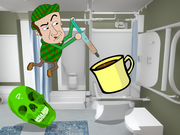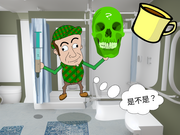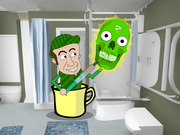really / truly / indeed / real / true / genuine
真
=
具
+
十
:
Mnemonic symbol: a replicator. It generates real and genuine things out of nothing. Looks like a microwave with a cross as antenna. James II of England (zh) broke his replicator (真) in front of the encampment ((e)n1): the cross (十) on the top is broken. Using his toolbox (具), James II of England tries his best to fix it. Fortunately he has a genuine, authorized, real (真) replacement cross.
to be (followed by substantives only) / correct; right; true / (respectful acknowledgement of a command) very well / (adverb for emphatic assertion)
是
=
旦
+
龰
:
Mnemonic symbol: a skull, from "to be or not to be".
Sherlock Holmes (sh) starts his day in the space station's bathroom (Ø4) with a mug of coffee (旦). Holding a skull (mnemonic symbol for 是) in his hands, he asks himself "to be, or not to be" (是). He wonders if he can make the skull come back to life using lots of coffee, and injects coffee from his mug into the skull using a syringe (龰).
Sherlock Holmes (sh) starts his day in the space station's bathroom (Ø4) with a mug of coffee (旦). Holding a skull (mnemonic symbol for 是) in his hands, he asks himself "to be, or not to be" (是). He wonders if he can make the skull come back to life using lots of coffee, and injects coffee from his mug into the skull using a syringe (龰).
是
=
日
+
下
+
人
:
Mnemonic symbol: a skull, from "to be or not to be".
Sherlock Holmes (sh) watches the Neanderthal Man (人) trying to climb to the sun (日) on a ladder (下) in the space station's bathroom (Ø4). Sherlock is afraid that he'll open the window, so he puts on a big skull (是) and scares him off.
Sherlock Holmes (sh) watches the Neanderthal Man (人) trying to climb to the sun (日) on a ladder (下) in the space station's bathroom (Ø4). Sherlock is afraid that he'll open the window, so he puts on a big skull (是) and scares him off.
to rise / to flourish / to become popular / to start / to encourage / to get up / (often used in the negative) to permit or allow (dialect) / maybe (dialect)
feeling or desire to do sth / interest in sth / excitement
to obtain / to get / to gain / to catch (a disease) / proper / suitable / proud / contented / to allow / to permit / ready / finished
structural particle: used after a verb (or adjective as main verb), linking it to following phrase indicating effect, degree, possibility etc
to have to / must / ought to / to need to
得
=
㝵
+
彳
:
Because Don Quixote kicked the genie's lamp from the rooftop of the Erechtheion as far as to inside of the Eiffel Tower, the genie demands Don Quixote to apologize. Inside of the Eiffel Tower, Don Quixote kowtows to the genie, who takes back the black sneakers he gave to Don Quixote earlier.



